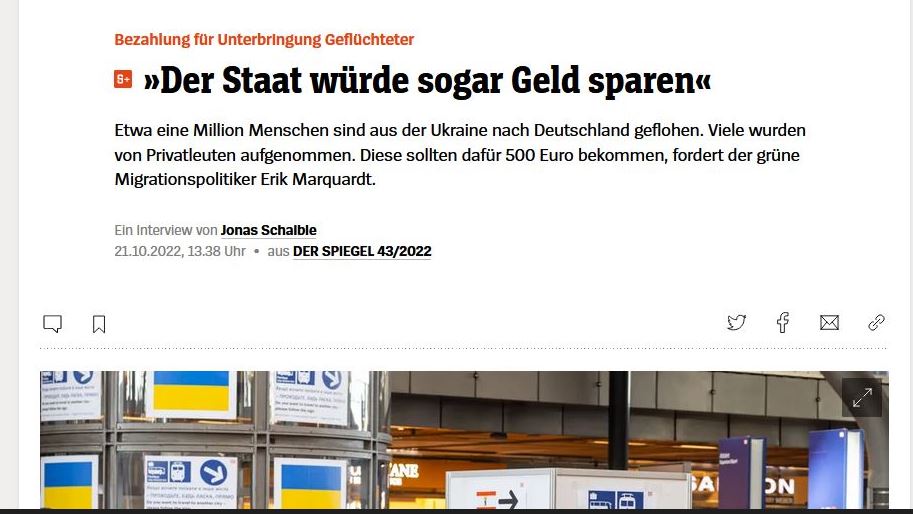500 € for reception of refugees

Because many municipalities are currently working at their capacity limits, I have in the mirror proposed that private citizens should receive 500 € for the accommodation of refugees from Ukraine.
SPIEGEL: Mr. Marquardt, especially because of the Russian invasion of the Ukraine are again hundreds of thousands of people to Germany fled. How well does the accommodation work?
Marquardt: It works, but the shelters are full and it also works because many refugees are accommodated privately. There is a great willingness to help. This makes up for the fact that the state has started to dismantle shelters or reduce personnel costs in recent years.
SPIEGEL: The war will presumably continue, and no one can say for how long. How can the state ensure that all refugees are well taken care of?
Marquardt: In principle, the accommodation and care of refugees is a state task. It must remain so. But there's nothing wrong with getting away from centralized accommodations - private rooms help, and the state should quietly promote that, too.
SPIEGEL: What do you mean?
Marquardt: I could well imagine that you get 500 euros if, for example, you offer a home to a Ukrainian woman with a child or a refugee. There are plenty of large houses with free rooms, many people have space, they want to help, but they also have to cover the costs. That is difficult for many people at the moment, and the operators of shelters also receive a lot of money from the state for this.
SPIEGEL: Would there then be 2000 euros for a family of four? Commercial conditions would quickly be reached, probably not to the advantage of the refugees.
Marquardt: That would have to be clarified in detail, there are anyway a few detailed questions about the arrangement in the tenancy law, which must be solved, but also can be solved. It would probably depend on how many rooms are made available. One thing is clear to me: it must not become a business and must not be at the expense of the refugees.
SPIEGEL: How are you going to prevent that?
Marquardt: The rooms should not be offered directly on a platform, but should be arranged with state support. This would prevent people from living in unworthy conditions or being exploited, but also ensure, for example, that people with a certain language background come together, be it Ukrainian, Russian, English, French or German. There should also be a place to mediate and find solutions to problems. Private individuals should also not take in more than one family and the program should be limited in time. Otherwise, no one will benefit from it.
SPIEGEL: Who would get anything out of it?
Marquardt: All of them, to be honest. The people who would like to help, but wonder whether they can afford it or whether there is a good framework for it. The refugees who often have to live in overcrowded mass accommodations. They would have more peace and quiet, more help with finding a job or dealing with bureaucracy, and would be able to integrate into society more easily. And the general public would also benefit, because the state would even save money.
SPIEGEL: Would he?
Marquardt: Accommodation operators get much more money per person per night, often over 1000 euros per month. So accommodation currently costs much more money than the proposed support for private accommodation. Of course, there would be additional costs for organization and administration, but it would still be much cheaper. If the refugees are also better supported privately in finding jobs, it would also cost no more money at all more quickly, but would bring in tax revenue. There would also need to be a complaints office so that there can be a quick response if problems arise somewhere and all sides know that they are not stuck. Then this could work very well.
SPIEGEL: Do you see this as a permanent solution or a remedy for the current situation in Ukraine?
Marquardt: As I said, in principle, the care of refugees remains a state task. Refugees should also quickly become part of society and find their own apartments. I would not limit the program to nationalities, but open it to all recognized refugees, but I think it is an all-around advantageous opportunity to test such a program for a year. After that, we can see if it becomes something more - hopefully even Europe-wide.